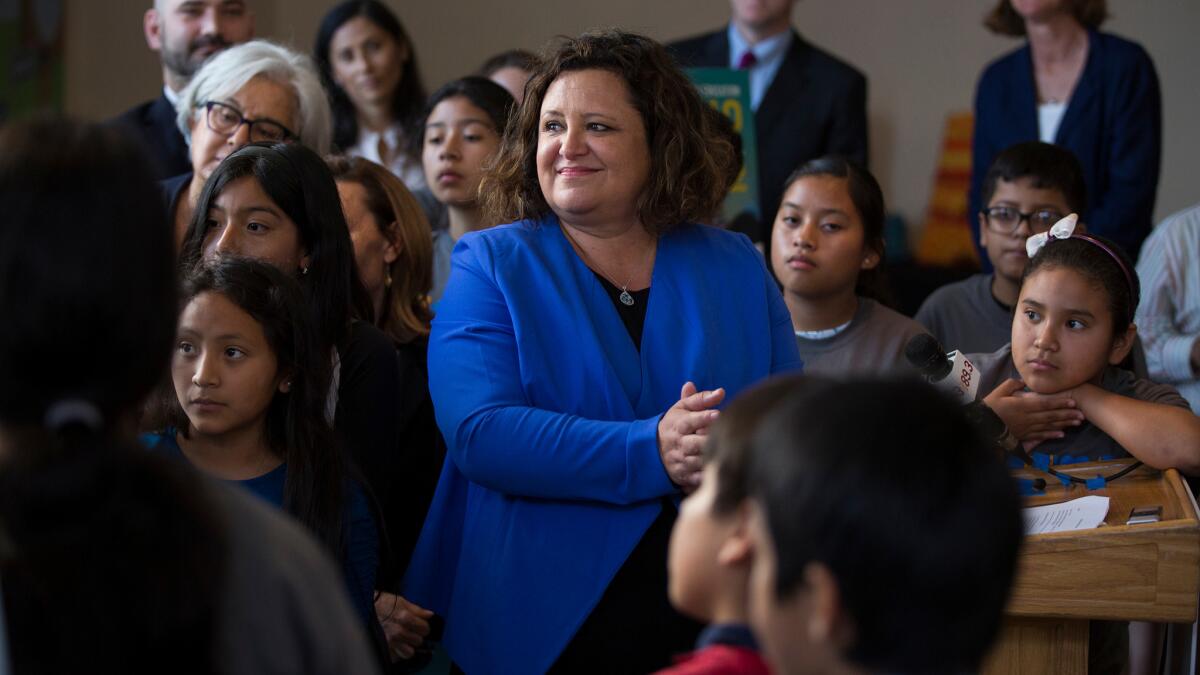Cloning great schools is latest in long line of L.A. reform plans

- Share via
The latest reformers intent on improving Los Angeles schools are confident that they have it right.
The trick, they say, is not to get shoehorned by theories or politics. Instead, simply find a good school and make another one just like it.
Then repeat. And repeat. And repeat.
Until 160,000 Los Angeles students in bad schools get into excellent ones.
Any effective school is worth copying, the reformers say. It doesn’t matter if it has a teachers union or not, whether the focus is great literature, performing arts or science. All models are welcome, as long as students are learning.
“We are committed to replicating schools that are already working,” said Myrna Castrejón, executive director of Great Public Schools Now, the recently formed nonprofit that has adopted this mantra. “This is not about programs and this is not also about ideas or programmatic grants about what curriculum might work.”
The nonprofit was born out of a controversial plan, leaked to The Times last year, to move at least half of L.A. Unified students into charters schools over eight years. But Castrejón, speaking at the group’s inaugural event in June, avoided focusing on charters as she described schools that would overcome barriers of poverty and language — as well as generations of low expectations and poor academic performance.
“Within those four walls, success is the only option because every single adult, every family member, every teacher, every principal is committed to fulfilling the mission of high success for students,” she said. “That’s when success happens. It’s the entire ecosystem within that school that works.”
Replication is one of the latest in a long line of strategies to improve lagging academic achievement in urban schools, including those in Los Angeles. And, as with the others, there’s no escape from the crucible of politics and controversy.
To skeptics, including L.A. school board President Steve Zimmer, the newly unwrapped plan looks like a thinly veiled effort to spur the rapid growth of charter schools, which he opposes. He believes the loss of student funding to charters would leave the district with limited resources to help students left behind — likely the most expensive and difficult to serve.
“The way the organization has chosen to develop, the messaging seems very clear: that this is primarily about charter-school expansion,” Zimmer said. “If it turns out to be otherwise, this would be something I would be very open to.”
Charters are operated independent of district control and are exempt form some rules that govern traditional campuses. Most are nonunion.
See the most-read stories in Local News this hour >>
Zimmer and other critics base their skepticism on the pro-charter background of the new group’s board of directors and on the leaked proposal, prepared last year under the auspices of the Eli and Edythe Broad Foundation. That plan slammed L.A. Unified, saying it provided a poor education and continually regressed. It called on donors to contribute $490 million to move at least half of district students into charters in eight years.
Some in that reform camp still believe such a plan would boost students. They dismiss concerns that swift charter growth would drive L.A. Unified into insolvency.
And donors appear to be priming the charter pump. Last week, the Walton Family Foundation announced it is setting up a new $250-million nonprofit to give charters low-interest loans to create and expand facilities in L.A. and elsewhere. Marc Sternberg, director of the Walton K-12 Education Program, sits on the board of Great Public Schools Now.
Replication has been tried in traditional public schools, but the concept especially has caught fire in the charter sector, where groups across the country are trying to bottle success, most often defined by standardized test scores.
Walton and another deep-pocketed organization, the Bill & Melinda Gates Foundation, are among those that for some time have invested heavily in expanding “high-quality” charter organizations.
For Gates, the emphasis fine-tunes an earlier push to create small schools. With federal backing, the foundation spent $2 billion spreading the small schools gospel across the country, only to conclude later that smaller isn’t necessarily better.
Gates and other groups then drove national policy toward evaluating teachers with test scores. That effort continues, although its momentum has slowed against a backlash from teachers, their powerful unions and parents.
So far, replication has not prompted the same pushback, even with its charter bent.
In May, the U.S. Department of Education announced a competition to award $65 million in replication grants to as many as 20 charter management organizations.
“We are excited to expand promising charter schools through this year’s competition,” assistant deputy secretary Nadya Chinoy Dabby said in a statement.
The department cited a 2013 study by Stanford University’s Center for Research on Education Outcomes, in which researchers concluded that schools in well-run charter management organizations — those that operate multiple campuses — showed strong performance. Their students improved each year, benefiting from the equivalent of up to 50 more days of learning in reading and 43 more days in math per year.
Charter critics dispute that conclusion, and even supporters warn that re-creating an excellent school is neither easy nor fast.
“New schools have many, many moving parts, from staffing to curriculum to transportation to addressing kids’ health,” said Thomas Toch, a research fellow specializing in education policy at Georgetown University’s McCourt School of Public Policy. “It’s just really hard to get everything right, especially in the short term.”
Join the conversation on Facebook >>
Think horse racing, he said: “You can be sired by American Pharoah, but there’s no guarantee you’ll be race-worthy.”
“What seems to be new with the advent of charter management organizations,” he added, “is the sort of systematic attempt to replicate schools in a network.”
High-performing and low-performing charters often look similar on the surface, right down to the inspirational banners about going to college, according to research led by Robin Lake, director of the Center on Reinventing Public Education at the University of Washington Bothell. Many require student uniforms, a longer day and academic year, frequent testing to measure learning, and tutoring for students who fall behind.
California’s leading charter groups, including some operating within L.A. Unified, are among the best at maintaining high performance from school to school, said Lake.
By contrast, she said, traditional school systems expend much effort just holding onto successes.
“In districts, you tend to see people trying to protect good schools from losing their distinctiveness,” for example, after a star principal moves on, Lake said. “They try to wall off the good things and protect them rather than replicate them throughout the district.”
Some business titans-turned-philanthropists espouse running schools more like businesses, but there are more variables involved in nurturing an academic community than in growing a chain of hamburger stands, said UCLA education professor John Rogers.
“The focus on replication in education generally is used in much the same way as businesses talk about franchises: You establish a profitable model and then duplicate this effort in other settings,” Rogers said. “Replication as franchising assumes that educational improvement is a narrowly technical process that entails creating the right mix of curriculum, instruction, materials, and facilities and then reproducing this special sauce elsewhere.”
This model, he added, “downplays the importance of local context and the experiences and ideas of local educators and community members.”
Castrejón’s counterpoint is her group’s willingness to embrace a wide range of successful schools, which would allow for communities to choose whatever model of schools worked for them.
L.A. Unified, too, has run through plenty of improvement strategies: forced integration, voluntary integration, local control, central control, phonics, school construction and iPads-for-all, among them.

The direct precursor to Great Public Schools Now was something called Public School Choice. That venture was conceived by then-school board member Yolie Flores as a way to provide newly built schools to charter groups through an open competition.
Charters assumed that higher test scores would be enough to prevail against other organizations and district teams.
In the end, however, parents rallied behind district teachers in nonbinding but widely publicized votes. And the superintendent and board selected few charters.
On this round, it is the charter-friendly leadership of Great Public Schools Now (with a board that includes Yolie Flores) that will choose the winners.
“A lot of times we talk and get distracted with politics and egos,” Flores said. “We want to look at good schools, public schools, in whatever form they come in.”
Twitter: @howardblume
Editor’s note: Education Matters receives funding from a number of foundations, including one or more mentioned in this article. The California Community Foundation and United Way of Greater Los Angeles administer grants from the Baxter Family Foundation, the Broad Foundation, the California Endowment and the Wasserman Foundation. Under terms of the grants, The Times retains complete control over editorial content.
MORE LOCAL NEWS
Cloning great schools is latest in long line of L.A. reform plans
Beverly Hills accused of driving homeless man out of town with private security
Samosas, sambusas and pizza: How Californians end their Ramadan fasts
More to Read
Sign up for Essential California
The most important California stories and recommendations in your inbox every morning.
You may occasionally receive promotional content from the Los Angeles Times.











